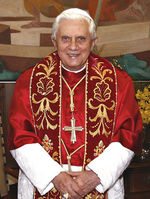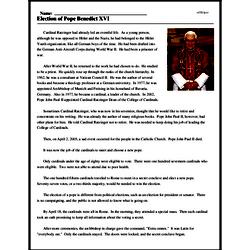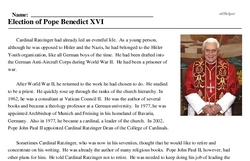Election of Pope Benedict XVI
Cardinal Ratzinger had already led an eventful life. As a young person, although he was opposed to Hitler and the Nazis, he had belonged to the Hitler Youth organization, like all German boys of the time. He had been drafted into the German Anti-Aircraft Corps during World War II. He had been a prisoner of war.
After World War II, he returned to the work he had chosen to do. He studied to be a priest. He quickly rose up through the ranks of the church hierarchy. In 1962, he was a consultant at Vatican Council II. He was the author of several books and became a theology professor at a German university. In 1977, he was appointed Archbishop of Munich and Freising in his homeland of Bavaria, Germany. Also in 1977, he became a cardinal, a leader of the church. In 2002, Pope John Paul II appointed Cardinal Ratzinger Dean of the College of Cardinals.
Sometimes Cardinal Ratzinger, who was now in his seventies, thought that he would like to retire and concentrate on his writing. He was already the author of many religious books. Pope John Paul II, however, had other plans for him. He told Cardinal Ratzinger not to retire. He was needed to keep doing his job of leading the College of Cardinals.
Then, on April 2, 2005, a sad event occurred for the people in the Catholic Church. Pope John Paul II died.
It was now the job of the cardinals to meet and choose a new pope.
Only cardinals under the age of eighty were eligible to vote. There were one hundred seventeen cardinals who were eligible. Two were not able to attend due to poor health.
The one hundred fifteen cardinals traveled to Rome to meet in a secret conclave and elect a new pope. Seventy-seven votes, or a two-thirds majority, would be needed to win the election.
The election of a pope is different from political elections, such as an election for president or senator. There is no campaigning, and the public is not allowed to know what is going on.
By April 18, the cardinals were all in Rome. In the morning, they attended a special mass. Then each cardinal took an oath promising to keep all information about the voting a secret.




